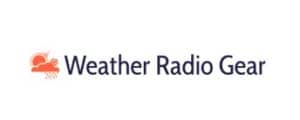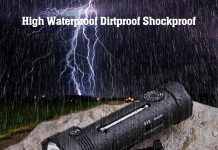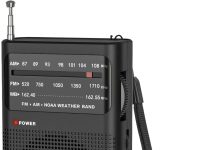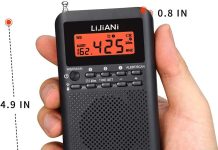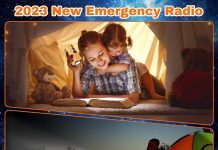Imagine never having to worry about missing important weather alerts while you sleep. That’s the promise of weather radios, devices specifically designed to wake you up with alerts at night. In this article, we will explore the functionality of weather radios and their ability to ensure your safety and peace of mind during inclement weather conditions. Discover how these devices can provide timely information about severe storms, tornadoes, and other weather emergencies, ensuring you are always prepared and protected, even while you sleep.
Review contents
Benefits of Weather Radios at Night
Prevention of Sleep Interruption
One of the primary benefits of using weather radios at night is their ability to prevent sleep interruptions. Weather radios are designed to provide alerts and warnings for hazardous weather conditions, such as severe storms, tornadoes, and hurricanes. By having a weather radio in your bedroom, you can rest assured knowing that you will be promptly alerted to any potential dangers, allowing you to sleep peacefully through the night without worrying about missing important warnings.
Early Warning of Weather Hazards
Another advantage of weather radios at night is their ability to provide early warnings of weather hazards. When severe weather is approaching, the National Oceanic and Atmospheric Administration (NOAA) issues alerts and warnings through their network. Weather radios receive these alerts and immediately broadcast them, giving you valuable time to prepare and take necessary precautions. With a weather radio by your side, you can stay one step ahead of dangerous weather conditions.
Immediate Updates on Dangerous Conditions
Weather conditions can change rapidly, especially during the night when many people are asleep. Weather radios provide immediate updates on dangerous conditions, such as flash floods, thunderstorms, or high winds, even when you are not actively monitoring the weather. This allows you to stay informed and make informed decisions about your safety, even during the late hours of the night. With a weather radio, you can receive critical updates without the need to rely on other sources, ensuring you are always aware of potential dangers.
Features of Weather Radios for Night Alerts
Siren or Alarm Sounds
To effectively wake you up during the night, weather radios are equipped with siren or alarm sounds that are specifically designed to capture your attention. These sounds are loud and distinct, ensuring that you are awakened immediately when there is an alert or warning. The purpose of these sounds is to grab your attention and motivate you to take action and seek shelter if necessary.
Automatic Activation
Weather radios for night alerts often come with automatic activation features, which allow them to turn on automatically when an alert or warning is issued. This means that even if you are not actively listening to the radio, it will still activate and broadcast the necessary information to wake you up if there is a hazardous weather event. With automatic activation, you can rest assured that you will be alerted when you need it most.
Specific Alerting System
Weather radios are programmed to receive specific types of alerts and warnings, ensuring that you are only awakened for the most critical events. These radios are designed to filter out non-essential information and only activate for severe weather conditions that pose a direct threat to your safety. This specific alerting system minimizes false alarms and ensures that you are alerted when there is a genuine need for concern.
Factors to Consider for Effective Night Alerts
Location and Reception
To ensure effective night alerts, it is important to consider the location and reception of your weather radio. Weather radios rely on a strong signal to receive alerts and broadcast them to you. Therefore, placing your radio in an area with good reception, such as near a window or in an elevated position, can improve its effectiveness in providing timely alerts.
Volume and Alert Tone Settings
Another factor to consider is the volume and alert tone settings of your weather radio. It is important to choose a radio that allows you to adjust the volume levels to a level that will wake you up without being too loud or disturbing your sleep unnecessarily. Additionally, having the option to customize the alert tone can be beneficial as it allows you to select a tone that is most effective in capturing your attention.
Personalized Alert Options
Some weather radios offer personalized alert options, allowing you to select the specific types of alerts that you want to receive. This can be particularly useful if you live in an area that is prone to certain types of weather events, such as tornadoes or hurricanes. By customizing your alerts, you can ensure that you are only awakened for the weather conditions that are most relevant to your location and personal safety.
Challenges and Limitations
False Alarms and Over-reliance
One challenge of using weather radios at night is the possibility of false alarms. While weather radios are designed to filter out non-essential information, there is still a chance that you may be awakened for a false alarm. Over-reliance on weather radios alone can also be a limitation, as they may not capture all potential hazards. It is important to use weather radios as part of a comprehensive alert system, including other sources of information such as local news and weather apps.
Interference and Reception Issues
Interference and reception issues can also pose challenges to the effectiveness of weather radios at night. Factors such as distance from the broadcasting transmitter, atmospheric conditions, and physical obstructions can impact the clarity and reliability of the signal. It is crucial to place your weather radio in an optimal location and ensure that it has a strong signal reception to minimize the chances of missing important alerts.
Compatibility and Accessibility
Weather radios come in different models and formats, which can lead to compatibility and accessibility limitations. It is important to choose a weather radio that is compatible with the alerts and warnings issued by the NOAA, ensuring that you receive accurate and relevant information. Additionally, considering the accessibility features of the radio, such as large buttons or a backlit display, can make it easier to use during the night, especially for individuals with visual impairments or limited mobility.
Choosing the Right Weather Radio for Night Alerts
Analog vs. Digital Radios
When choosing a weather radio for night alerts, you will come across both analog and digital options. Analog radios may be more affordable, but they lack some of the advanced features found in digital radios, such as automatic activation and specific alerting systems. Digital radios offer more precise and customizable alerts, providing a higher level of reliability and convenience.
NOAA Certification
NOAA certification is a crucial factor to consider when selecting a weather radio for night alerts. NOAA-certified radios have been tested and approved by the National Weather Service, ensuring that they can receive and broadcast reliable weather alerts. Look for the NOAA logo or certification on the radio to ensure that it meets the necessary standards.
Battery Backup and Portability
Having a weather radio with battery backup is essential for uninterrupted alerts, especially during power outages or when you are away from an electrical outlet. Additionally, considering the portability of the radio can be beneficial if you travel frequently or want to take the radio with you to other locations. Look for radios that offer long battery life and are compact and lightweight for easy transportation.
Setting Up and Testing your Weather Radio
Optimal Placement and Antenna Position
To maximize the effectiveness of your weather radio, it is important to place it in an optimal location with good reception. Consider placing the radio near a window or in an elevated position to improve signal reception. Additionally, adjusting the antenna position can enhance the clarity of the signal and reduce potential interference.
Programming and Customization
After setting up your weather radio, it is crucial to program it according to your location and personal preferences. Most weather radios allow you to input your specific county code, ensuring that you receive alerts for your exact area. Take the time to customize the settings, such as volume levels and alert tones, to match your needs and preferences.
Periodic Testing and Maintenance
Regularly testing your weather radio is essential to ensure that it is functioning properly and receiving alerts correctly. Perform periodic tests by activating the alert system and confirming that the radio responds accordingly. Additionally, make sure to replace the batteries as needed and keep the radio clean and free from dust or debris that may impact its performance.
Tips for a Restful Night’s Sleep with Weather Radios
Adjusting Sound Levels and Brightness
To avoid unnecessary sleep disruptions, it is important to adjust the sound levels and brightness of your weather radio to comfortable levels. Experiment with different volume settings to find the right balance between waking you up in case of an alert and allowing you to sleep peacefully. Similarly, adjusting the brightness of the display to a dimmer setting can prevent it from being too distracting during the night.
Night Mode and Auto Dimming
Some weather radios offer a night mode or auto-dimming feature, which automatically adjusts the display brightness based on the ambient light levels in the room. This can be especially helpful for those sensitive to light during sleep. Night mode can create a more sleep-friendly environment, ensuring that the radio does not disrupt your sleep with bright lights.
Pairing with Bedside Devices
If you prefer not to rely solely on the sound or lights of your weather radio to wake you up, consider pairing it with your bedside devices. Some weather radios come with auxiliary outputs that allow you to connect them to other devices, such as bed shakers or vibrating alarms. This way, you can be alerted through multiple senses, increasing the chances of waking up during critical weather events.
Comparison with Other Alert Systems
Mobile Phone Alerts
While mobile phone alerts can also provide weather alerts at night, they have certain limitations that may make weather radios a better choice. Mobile phones rely on an internet or cellular connection, which can be disrupted during severe weather events. Weather radios, on the other hand, receive alerts directly from the NOAA, ensuring reliable and immediate information. Additionally, mobile phone alerts may be easily missed if the phone is on silent or in another room, whereas weather radios are specifically designed to wake you up with loud and distinct sounds.
Outdoor Sirens and Public Warning Systems
Outdoor sirens and public warning systems are commonly used to alert communities of impending severe weather events. While these systems can be effective in capturing the attention of a large area, they may not always be heard indoors, especially during the night when people are asleep. Weather radios, on the other hand, provide personalized and targeted alerts specifically designed to wake you up, ensuring that you receive the necessary information irrespective of your location.
Commercial Alarm Clocks
Commercial alarm clocks are commonly used to wake individuals up in the morning, but they may not provide the same level of effectiveness as weather radios for night alerts. Alarm clocks typically do not have the capability to receive weather alerts and warnings, making them unreliable during severe weather events. Weather radios, with their dedicated alert systems and specific weather information, are better equipped to wake you up and keep you informed about potential dangers during the night.
Frequently Asked Questions
Are weather radios loud enough to wake you up?
Yes, weather radios are designed to be loud enough to wake you up during the night. They are equipped with siren or alarm sounds that are specifically designed to capture your attention and motivate you to take action in response to hazardous weather conditions.
Can weather radios distinguish between different alerts?
Yes, weather radios can distinguish between different alerts. They are programmed to receive specific types of alerts and warnings issued by the NOAA. This ensures that you are only awakened for severe weather conditions that pose a direct threat to your safety.
Can weather radios wake up heavy sleepers?
Weather radios are designed to wake up individuals with varying sleep patterns, including heavy sleepers. The loud and distinct siren or alarm sounds are specifically crafted to grab your attention and awaken you in the event of hazardous weather conditions.
Conclusion
Weather radios provide numerous benefits at night, including the prevention of sleep interruptions, early warnings of weather hazards, and immediate updates on dangerous conditions. With features like siren or alarm sounds, automatic activation, and specific alerting systems, weather radios are an effective tool for receiving critical alerts during the night. Despite challenges and limitations, such as false alarms and compatibility issues, choosing the right weather radio, setting it up properly, and personalizing the settings can maximize its effectiveness. By following tips for a restful night’s sleep with weather radios and understanding the comparison with other alert systems, you can feel confident in your ability to stay informed and safe during severe weather events.
